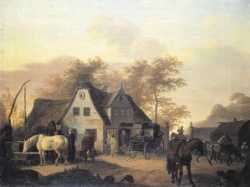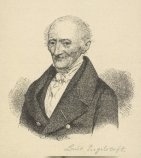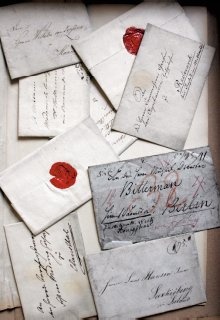Gunpowder, Bullets, and Censorship of Letters - Broken Seals 7
01. Nov. 2007

Holstien stagecoach at a post yard, 1808, Christian David Gebauer (1777-1831). The painting radiates a perfect idyl and gives us no notion of the censorship and surveillance which were characteristic of Denmark in those days.
Soon after the outbreak of war in August 1807 the crown prince issued a circular letter to authorities throughout the country ordering them to arrest all Englishmen in the kingdom and beware of anybody "that might be dubious and considered a spy". Exchange of letters with England was prohibited.
During the following month it was determined how to interpret this ban on letters and who should see to it that it was obeyed. It was decided that the ban on letters should cover any exchange of letters to and from England, and that all letters sent by Englishmen or other suspect persons in the kingdom should be examined. The task was entrusted to various authorities, but the overall responsibility ended up with a special "commission for enemy property" which should also deal with the question about English goods and values in the country.
It was the first time in Danish history that such a systematic and extensive censorship of letters was instituted. Contrary to the secret postal espionage which had been used frequently in the past and which took place without the letter writers discovering anything, the censorship was official.
The Continental System
The postal censorship was in continuation of the immemorial rules of war from 1683, a sort of war laws for the military. They forbade any communication with the enemy and prescribed punishment on life and honour. The new censorship was, however, justified differently: "The main purpose is to sever England's communication and commercial relations as far as possible, not only with the royal states, but also with the other part of the Continent. Absolutely no letters to and from England are permitted, no matter how innocent their contents may appear to be".
Behind the argument was Napoleon's Continental System supposed to preclude England from trade and contact with the Continent. For years the Danish government had resisted French pressure to join the Continental System, but as a result of the outbreak of war with England Denmark almost automatically became a part of the blockade.
It turned out to be quite a task to prevent that letters were sent out of the country to England. Censorship soon ceased all attempts to send letters by the postal service and consequently it was mainly at custom houses and town gates or on ships in the open sea that hidden letters were found. Some of these revealed that Danish merchants were organizing trade relations with the enemy to the crown prince's inexpressible indignation. These cases ended up with the so-called commissions for enemy property and often in the Supreme Court where severe sentences were pronounced.

Historian Laurids Engelstoft (1774-1851).
The Royal Library
Letter Opening in Kiel
The crown prince did not content himself with the official censorship, but made sure that all mail from Zealand was brought to Kiel where thousands of letters were being opened. The historian Laurids Engelstoft serving as a secretary to the Duke of Augustenburg wrote in his diary that "among the opened letters a prodigious number of English ones have been found which have all been detained". There was much important information in the letters, Engelstoft wrote, nevertheless the crown prince did not try to hide the surveillance; on the contrary many letters "are being opened without being read just to make them appear as if they have been read". It was a totally new strategy the prince launched: Instead of keeping the postal espionage secret and thereby gain access to the intelligence, he tried to scare the letter writers out of writing.
The strategy was in line with the prince's attempt to get an iron grip on the atmosphere in the population by means of a prohibition against rumour-mongering. In the logic of the crown prince the scare campaign against the letter writers was well-founded: "Most of the letters arriving by the latest mail from Copenhagen shall be detained in Kiel because they reveal an undesirable atmosphere", Engelstoft writes; "By opening them they had, as someone said, learned more than they liked".
Many letter writers raged against the government and the army in Holstein that "eats and sleeps and even demands that citizens and peasants should defend themselves". Worst was probably a letter sourly remarking that no-one would wonder if the citizens of Copenhagen "became all English the way they were being treated by the government". It was exactly this ill-feeling that crown prince Frederick tried to quell by giving people the impression that their letters were being read.

Selection of letters intercepted during the wars against England. The letters are today kept in the Danish National Archives. Photo: Foto: Lars Hansen, Jyllands-Postens Forlag.
From Enlightened to Darkened Despotism
Frederick's disposition did not become more cheerful during the war which ended as a catastrophe to the country with the loss of Norway in 1814. During and after the war the country developed to a pronounced degree into a police state which by means of informers, plain-clothes agents, and provocateurs infiltrated and monitored any approach to opposition. The line that Frederick as a crown prince had laid concerning letters was continued and intensified after the end of the war. The crown prince ascended the throne in 1808 as King Frederick the 6th and criticism of him - even in private letters - was punished severely. This happened to the unfortunate Counsellor Marcus Nissen Westermann.
As chance would have it he and some senior government officials sent letters to Norway shortly after the country's separation from Denmark in 1814. The letters were sent by an amateurish, self-appointed secret courier who was captured by the Swedes who with malicious pleasure sent the Danish king copies of the many letters filled with criticism of the government. Worst of all was Westermann's letter, a personal letter to a relative containing harsh words about the king and his politics.
Proceedings were instituted against Westermann in the Supreme Court. The counsel for the defendant, the brilliant lawyer Rottbøll, turned the defence into a general defence of the secrecy of the mails. The letter had reached the government in an illegitimate way, and a personal letter was comparable with a confidential conversation. What mild and gracious government would venture to listen in to gentlemen's private conversation?
In short, the case became a touchstone of the freedom of expression and the secrecy of the mails. Bu the defence was rejected out of hand by all the judges of the Supreme Court who after lengthy consideration decided on banishment - according to the freedom of the press section. A personal letter might participate in spreading treacherous feelings and rumours and was therefore comparable with a published text. Because of a personal letter Westermann had to take the same road as the exiled dissidents, P.A. Heiberg and Malte Conrad Bruun; a nadir in the history of the so-called enlightened despotism.
This article may be copied or quoted with MuseumsPosten, Post & Tele Museum as source.
Comment this article
Only serious and factual comments will be published.
Other comments for this article